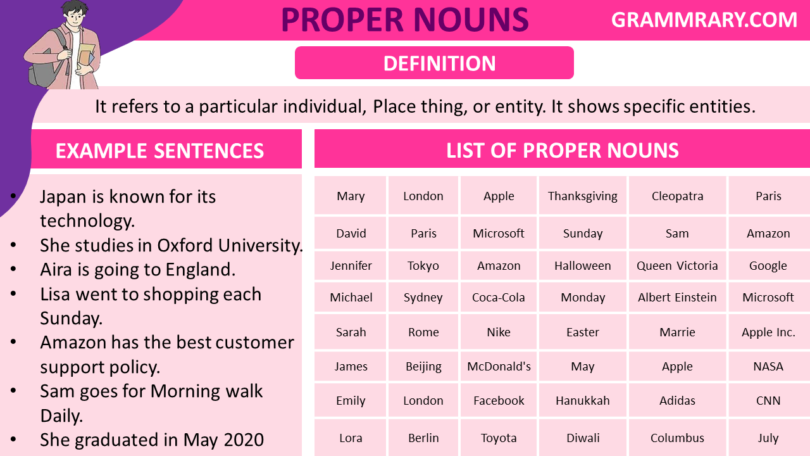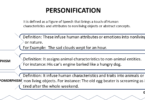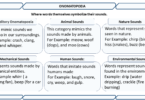The Proper Nouns are non-generic, specific names, that play the most important part in English Grammar. Unlike Common Nouns, Proper Nouns are specific names of any person, place, or thing. These are different from other types of Nouns and are capitalized. It includes names of persons, places, or things, including brands, companies, organizations, or anything that describes a specific object. When we compare common nouns with proper nouns we say a noun would be common or otherwise proper. If it isn’t common, it’s proper.
What is a Proper Noun?
Proper Noun Definition:
It refers to a particular individual, Place thing, or entity. They don’t represent general things and shows particular entities.
Proper Nouns Examples:
Here are Examples of Proper Nouns.
- Ella (name of a person)
- The Educators (name of a place)
- United States of America (name of a place)
- Campbell Biology (name of a book)
- Nike (name of a brand
- Adidas (name of a brand)
Example Sentences of Proper Nouns:
Following are the examples of uses of proper nouns in sentences.
- China is known for its technology.
- She studies at Oxford University.
- Aira is going to England.
- Lisa went to shopping every Sunday.
- Amazon has the best customer support policy.
Categories of Proper Noun:
Here are seven types of proper nouns.
Names: It includes specific names of people. These are names that specify someone. It requires capitalization.
Titles given to people: It is the title of a person. For example, Queen Victoria.
Places: This category in Proper Nouns includes the name of any place, city, or country.
Calendar days: Months and Week Days are proper nouns. For Example: May and Friday etc. This doesn’t include season names. Season names are only capitalized if they are used as Proper Nouns.
Holidays: It includes specific Holidays. For Example, Labor Day, Hanukkah, etc.
Brands and companies: These are specified names of Brands.
Titles of works: Any particular work of art and literature comes into this category. For Example, The Thinker, Romeo and Juliet, etc.
| Category | Examples: |
| Names | Ella, John, Aira, Elsa, Emma, Peter, Henery etc. |
| Titles given to people | President, Prime Minister, Professor, Captain, Doctor, Reverend, Judge, Senator |
| Places | New York City, Paris, Tokyo, Sydney, Rome, Beijing, Los Angeles, Berlin |
| Calendar days and Months | Monday, Tuesday, Friday, Sunday, June, May, etc. |
| Holidays | Ramadan, Thanksgiving, Halloween, Easter, Diwali, Independence Day |
| Brands and companies | Apple, Google, Microsoft, Nike, McDonald’s, Amazon, Facebook, etc. |
| Titles of Work | Mona Lisa (painting), Hamlet (play), The Scream (artwork), etc. |
Capitalisation Rules for the Use of Proper Nouns in Sentences
Capitalization Rules for Proper Nouns play the most important role in communication. But it doesn’t matter in Oral Communication where tone, voice modulation, pauses, and Pronunciation matter.
1- Capitalise directions when included in the part of any particular place. (ProperNoun).
For example: We went to the Western Ghat section.
2- Capitalise relationships when used as a name to pinpoint any particular person.
For example: Did she know that Dad went to London?
3- Days and months Names are always capitalized.
For example: Are you going to University on Monday?
4- Seasons are only capitalized when used as a proper noun, not always.
For example, I bought the “The Autumn Leaf’” yesterday.
5- Professions are capitalized when used as a proper noun only. Begin a profession with a capital letter when addressing someone.
For example: Prime Joe Biden is doing everything for the betterment of the country.
6- Nationalities and countries are capitalized and describe a particular place or race.
For example: My friend is going on a vacation to Malaysia tomorrow.
Brand names are capitalized as they represent a particular brand.
For Example: Aira bought Puma sneakers.
Languages are proper nouns so always capitalized.
For example: I know three languages: English, Spanish, and French.
Historical Time and events are capitalized, but centuries don’t.
For Example: British India is a major era of development in the education system.
Proper Nouns List:
Here is a list of Proper Nouns.
| Mary | London | Apple | Thanksgiving | Paris |
| David | Paris | Microsoft | Sunday | Amazon |
| Jennifer | Tokyo | Amazon | Halloween | |
| Michael | Sydney | Coca-Cola | New Year’s Day | Microsoft |
| Sarah | Rome | Nike | Easter | Apple Inc. |
| James | Beijing | McDonald’s | Valentine’s Day | NASA |
| Emily | Los Angeles | Hanukkah | CNN | |
| Christopher | Berlin | Toyota | Diwali | July |
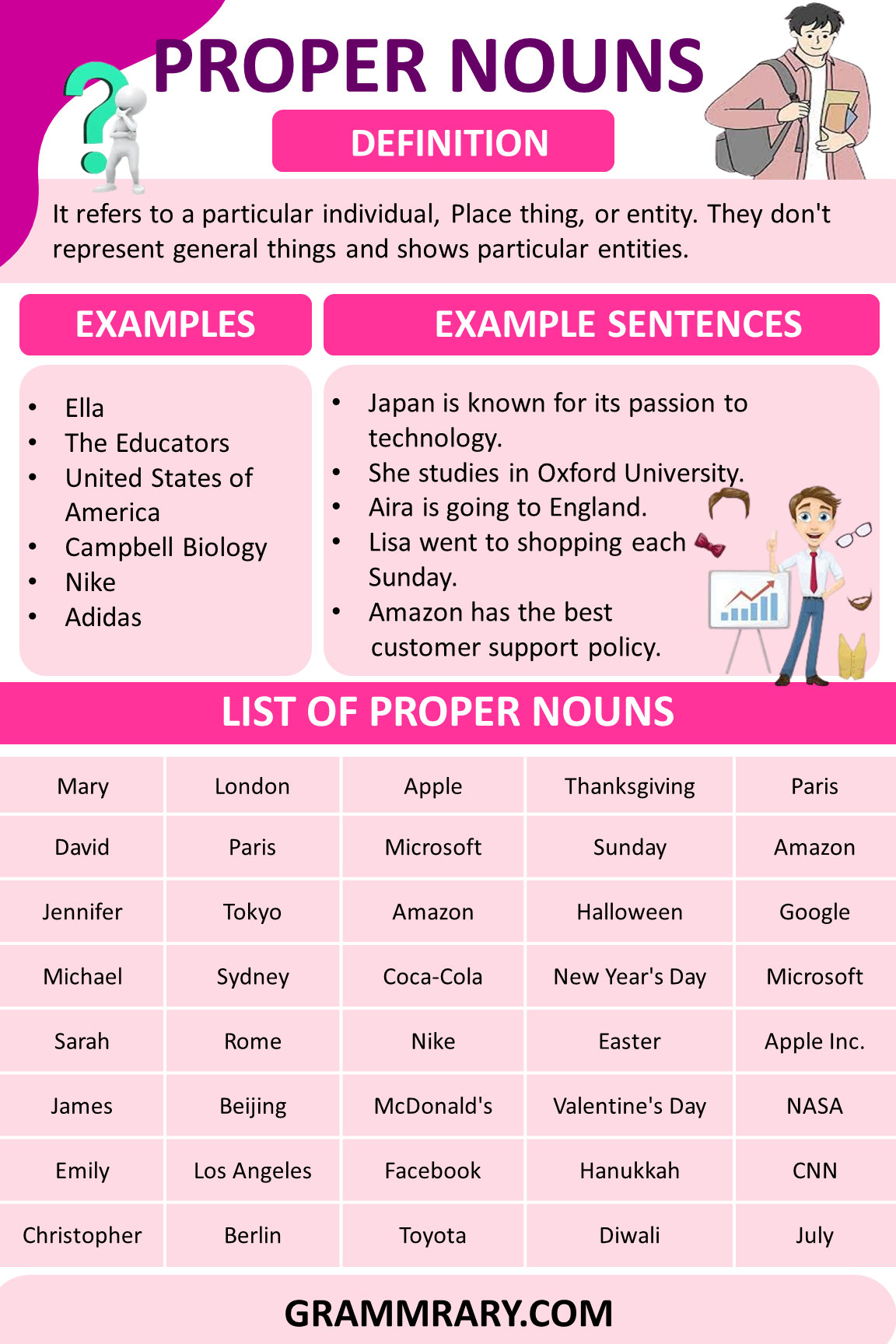
Proper noun definitions, examples, usage, and list.
Proper Nouns Quiz:
Here is the Proper Nouns exercise.
1-I went to Paris and France in May.
A) went
B) Paris and France
C) in
D) I
Answer: B) Paris and France
2- Amazon is a leading e-commerce platform.
A) Amazon
B) leading
C) technology
D) Company
Answer: A) Amazon
3- The Mona Lisa is portrayed in the Louvre Museum.
A) portrayed
B) Mona Lisa, Louvre Museum
C) in
D) The
Answer: B) Mona Lisa, Louvre Museum
4- Aira is going to France on December 25th.
A) celebrated
B) Aira, December
C) on
D) 25th
Answer: B) Aira, December
5-Ella is a well-known painter among all girls
A) girls
B) Ella
C) well-known
D) painter
Answer: B) Ella
6- Harry is a creative writer.
A) is
B) Harry
C) Creative
D) writer
Answer: B) Harry
Proper Noun Quizzes and Exercises are helpful to get a good command.
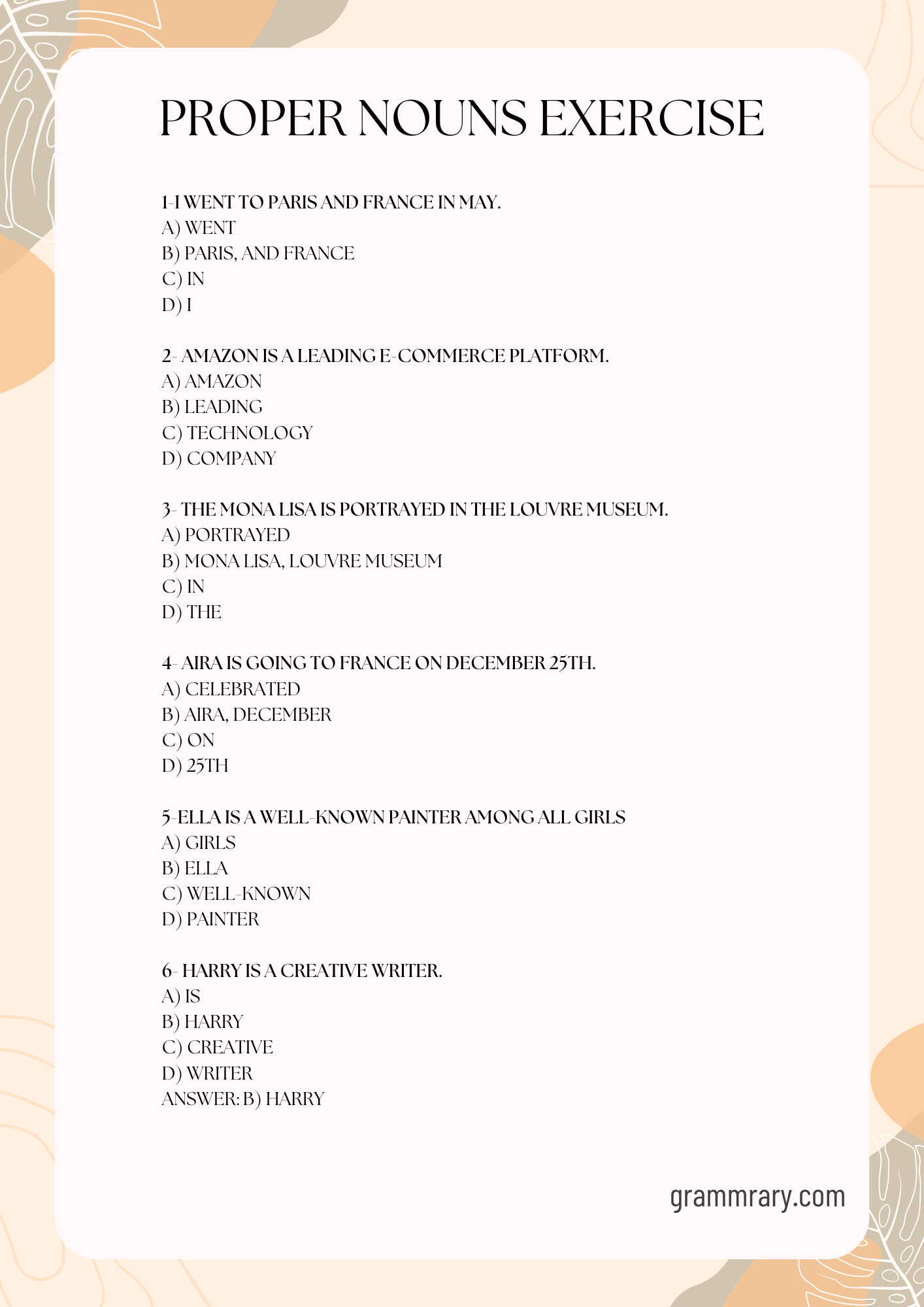
Proper Nouns MCQs with answer key.

